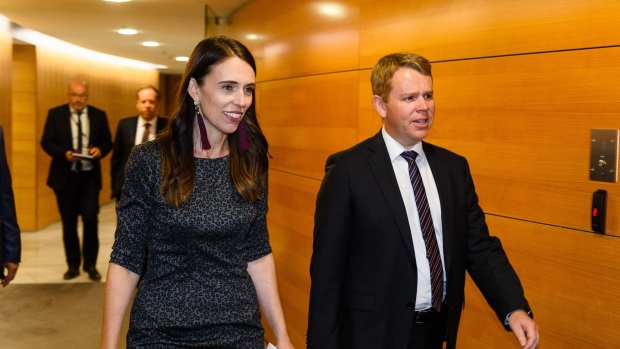Jan 21, 2023
Chris Hipkins’ Journey From Police Cell to New Zealand’s Next Prime Minister
, Bloomberg News

(Bloomberg) -- New Zealand’s next prime minister credits time spent in a police cell for sparking his interest in national politics.
Twenty-five years after his brush with the law as a student protester, Chris Hipkins is set to become the nation’s 41st premier.
The ruling Labour Party’s caucus on Sunday unanimously endorsed his promotion to leader following the shock resignation of Jacinda Ardern. He will be sworn in by the Governor-General on Jan. 25.
Hipkins, 44, faces an uphill battle to win Labour a third term in office at the Oct. 14 election. The party trailed the main opposition National Party in polls last month, and the new prime minister has less than nine months to revive its support in the absence of Ardern’s star power.
“Whoever was going to take this role on knew that they’d be filling big shoes,” said Lara Greaves, a political scientist at Auckland University. “It’s hard to tell exactly how the public perceive him at this stage and whether he’s prime ministerial enough.”
Nicknamed “Chippy” — an amalgam of his first and last names — the youthful-looking Hipkins presents as a likable, enthusiastic character with an ability to laugh at himself. But he also has a ruthless streak, and was often the minister Ardern turned to when problems arose.
“I like to think I’m pretty upfront and pretty straight with people,” Hipkins told reporters on Saturday. “I’m decisive and I can get things done. People won’t die wondering what I think.”
Asked whether the nation was ready for a red-haired leader, he quipped: “I think it was about time we had a ginger at the top.”
Less Charisma
Hipkins currently holds the weighty ministerial portfolios of education, police and public service. He was also the minister responsible for the government’s Covid-19 strategy during the most intense period of the pandemic.
Bryce Edwards, a lecturer in politics at Victoria University of Wellington, said Hipkins is less charismatic than Ardern but has the ability to connect with everyday people and win back voters who are deserting Labour.
“He doesn’t come across as cosmopolitan, he doesn’t wear the designer clothes,” Edwards said. “He likes sausage rolls and coke, and that’s desperately what Labour needs at the moment.”
Hipkins is also more centrist than Ardern and better placed to jettison some of the less popular policies she championed, which will be necessary to win back the political middle-ground and give Labour a chance of victory, he said.
That will be a tall order. The economy is forecast to enter a recession this year as the central bank hikes interest rates at record pace to regain control of inflation.
Student Protester
Hipkins became a household name during the pandemic when he fronted frequent news conferences in his role as Covid-19 response minister.
He lightened the nation’s mood during a lockdown in 2021 when he spoke of New Zealanders getting outside to “spread their legs” — he meant to say “stretch” them.
But being so closely associated with Covid restrictions, which the public ultimately grew frustrated with, could also prove to be a hindrance.
Hipkins was born and raised in the largely working-class Hutt Valley region near capital city Wellington. After being head boy in his final year of high school he studied at Victoria University, where he completed an arts degree majoring in politics and criminology.
It was during a 1997 demonstration outside parliament over the government’s tertiary education policies that a teenaged Hipkins and dozens of other students were arrested and taken to Wellington’s central police station.
The charges were found to be unjust and were dropped, and a subsequent court ruling helped to enshrine students’ right to protest.
The experience led to Hipkins becoming more involved in politics, he told parliament in his maiden speech.
‘Mr Fixit’
He became president of the students’ association, and after graduating had an advisor role in ministerial offices including that of then-Prime Minister Helen Clark.
Hipkins entered parliament in 2008, the same year as Ardern, winning the electorate of Remutaka even as Labour lost the treasury benches. He has retained the seat at four subsequent elections.
He spent nine years in opposition, including time as chief whip and education spokesperson.
After Ardern took Labour back into power in 2017, Hipkins built a solid reputation as a reliable minister and “Mr Fixit” for the administration.
He led reforms in the education sector and became health minister for a period when the incumbent was forced to resign. Last year, Ardern handed him the police portfolio when concerns about law and order were denting the government’s popularity.
His father told Newshub that the family has mixed feelings about what lies ahead given the torrent of abuse faced by Ardern.
However, he said politics had always been his son’s passion, revealing that a poll of students taken in a 1996 high school magazine concluded he was the most likely to become prime minister.
“I am here to make sure that New Zealanders can go out there and work hard to make a better life for themselves and for their families,” Hipkins said. “That’s what Labour has always stood for and that’s absolutely why I’m in politics.”
(Updates with confirmation of Labour caucus support in third paragraph)
©2023 Bloomberg L.P.







